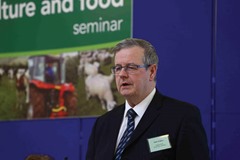Going for Growth in agri-food
 Richard Halleron reports on the Agri Food Strategy Board’s vision for the sector, as outlined by Chairman Tony O’Neill.
Richard Halleron reports on the Agri Food Strategy Board’s vision for the sector, as outlined by Chairman Tony O’Neill.
When addressing agendaNi’s agriculture and food conference, Agri Food Strategy Board (AFSB) Chairman Tony O’Neill discussed the themes within his organisation’s Going for Growth strategy, which sets out a development blueprint for farming and food in Northern Ireland up to 2020.
O’Neill explained: “Our recommendations include four fundamental things, which are to create bodies for the following: marketing, to help us to sell our product across the world; innovation; skills and entrepreneurship; and, on the industry side, to join hands so that there is one voice speaking for industry.”
He elaborated: “Those things are pretty clear in real terms. Innovation is a classic. In the course of our work, we found that we had 104 different places to go to talk about innovation. If you consider that Northern Ireland is a very small place, it is very difficult to say why we need so many different places. So, part of the challenge is knowing where to go for particular expertise or help. In a way, that typifies the issue and the reason why we have said that we want one body.”
O’Neill pointed to the clear need for a single marketing organisation – recommended in previous reports on agri-food – which would help to gain market access across the world for Northern Ireland’s products.
“Communicating what we do best is what is selling our products,” he reflected. “We produce food with passion, quality and environmentally friendly credentials. The green image is something that we have in our toolbox, and we need to maximise that across the world. We build on our green image, we build on our small farm infrastructure, and we build on sustainability.”
Tony O’Neill stressed that the agri-food industry, as a whole, has to be profitable in order to be sustainable right across the supply chain. While there has been and continues to be “tension between the farming community and processing … we are saying that the two things have to act together.”
He continued: “We have to be sustainable, we have to be profitable to survive, and we need to act as one. We need to be market-focused, and I have been controversial enough in the past to suggest that many farmers grow animals that are not necessarily meeting the needs of the market. So, the market has to drive our whole experience, and we have to make sure that we are growing animals and produce that meets market needs and expectations. That means that a huge amount of that market intelligence has to be channelled back from the processing sector, and you have it in the normal course of events back down into the producer section.”
Developing an innovative, integrated supply chain was essential but also a wide-ranging challenge. He explained: “We need clear communication on what we are doing and why we are doing it. We need to share best practice more so than we have done in the past and we need specific training and development to meet the market requirements. We have to work on a common plan across the supply chain.”
Tony O’Neill welcomed the very positive response received from the Executive to date regarding its declared support of the Going for Growth strategy. Both Agriculture Minister Michelle O’Neill and her enterprise counterpart, Arlene Foster, have formally recognised the significance of the AFSB strategy moving forward. For her part, the Agriculture Minister has confirmed that the farm business improvement scheme – proposed within the Going for Growth initiative – will receive funding through Northern Ireland’s new Rural Development Plan.
“Given that we are looking for a fundamentally different approach in farming and processing, AFSB is calling for a farm business improvement scheme, which will require significant funding from the Executive. When I say ‘significant funding’, I see that as being £250 million, supported by £150 million in other areas of the project,” O’Neill explained.
 “This level of investment from the Executive will unleash significant investment right down through the supply chain, and we have estimated that at £1.3 billion. So, at the moment, the total that we are looking at is about £1.7 billion or £1.8 billion. We are working on a timetable that suggests that those are 2020 targets, but, frankly, a lot of that can be front-ended and fast-tracked if we have the right approach and attitude to it.”
“This level of investment from the Executive will unleash significant investment right down through the supply chain, and we have estimated that at £1.3 billion. So, at the moment, the total that we are looking at is about £1.7 billion or £1.8 billion. We are working on a timetable that suggests that those are 2020 targets, but, frankly, a lot of that can be front-ended and fast-tracked if we have the right approach and attitude to it.”
Tony O’Neill noted that the board’s recommendations are challenging and big enough to make everyone in the sector stand back and think about it “but, equally I think that challenging targets are what we all live for.” He added: “On the industry side, we are fairly confident that we can do this. Our challenge, in practical terms, is whether government can move at the same pace as we wish to.”
In conclusion, he said: “The environment that we are in today is, I think, the best we have ever seen in the context that the Executive and the political arena recognise food today. The economics are clear. We have been successful in trying times when no-one else has. All those factors are putting opportunities on the table today for agri-food.
“This opportunity is on the table today, but that is not to say that it will be there in three years’ time if we do not take it now. It is sitting there ready for us to pick up. We have got to pick it up and secure it now, or, coming back in a few years’ time, we will find that it is not there available to us.”
2020 targets
• Increase turnover by 60 per cent
• Grow employment by 15 per cent
• Grow external sales by 75 per cent
• Boost added value by 60 per cent
Strategic themes
• Grow market share
• Work together
• Sustainable growth
• Innovation, entrepreneurship and skills
• Better regulation
• Finance growth
• Maximise food security





